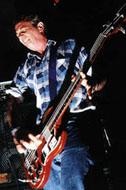
Comment
on this story
What:
Mike Watt
When:
Friday, May 3 at 10 p.m.
Where:
Blue Cats
Cost:
$8/$10
|
|

There would be no punk without Mike Watt— and our writer finds that intimidating.
by Matthew T. Everett
Mike Watt, bass player for the legendary California punk band the Minutemen, is widely regarded as one of the most affable and down-to-earth guys in American rock. He's the kind of guy who maintains his street credibility even after 11 years with a major label, the kind of guy who maintains his own web page, who answers his own email. He's the kind of guy who gives his home phone number to music writers from Knoxville.
For all that, though, he's still Mike Watt, for Christ's sake. He's the godfather of American punk, the guy who gets credit (almost all of it deserved) for taking Southern Cal hardcore away from the Orange County suburbs to a place in the stratosphere where punk, jazz, folk, art rock, and even a little country twang could exist together.
In fact, his established nice-guy status and his approachability really just make him seem that much more unapproachable. That he's so quietly assured and confident about being Mike Watt adds to his aura and affirms him as a paragon of the indie-music ideal. That he's so content to do things his way, not by fighting against corporate rock but by simply living almost entirely outside its system (or so it's seemed), reminds me that he's a real human being, not just a rock star. But his simultaneously die-hard and easygoing commitment to his own idiosyncratic muse, and the results of that commitment over the last 20 years, also make him a rock god.
So even if he did send me his phone number, that doesn't mean I wasn't intimidated. And being intimidated, I simply put it off—until, of course, it was too late, and he was out on tour. The afternoon I finally called, Mike was 3,000 miles away from the phone, preparing for the first show of his current tour in Louisiana. So, without alerting my editors at Metro Pulse, I'm stuck with putting together 800 words about Mike Watt, his legacy, his continuing importance 16 years after the Minutemen quit being the Minutemen and, of course, the music.
The logical starting point for any consideration of Mike Watt is the two-LP set Double Nickels on the Dime, released in 1984. It's a stunning document, intimate and epic, its 43 terse tracks adding up to an expansive treatise on the possibilities of what punk can be.
The growing instrumental prowess of the Minutemen was fully realized on Double Nickels, Watt's supple bass lines bounding around D. Boon's angular, staccato guitar work on top of George Hurley's punchy, dizzying drumming. The inescapable groove of the Minutemen had much in common with the British punk bands the Fall and Gang of Four, but the Minutemen—perhaps because they were from California, perhaps because they were just nicer guys—never had the screeching, manifesto-heavy self-righteousness of those bands. The Minutemen were equally intense, but the message was in the music, not in the sermon in the lyrics.
The Minutemen never really patterned themselves after their contemporaries, and avoided the rudimentary two- and three-chord guitar riffs and snotty attitude that still define what punk is to many people. What they came up with on Double Nickels was just as visceral as Black Flag, and it was just as smart as the Fall. But in the combination of heady experimental noodling and heartfelt songwriting, the Minutemen were different. There's something of the landscape of the American West in the looseness of their music, the dusty hills above Los Angeles, near San Pedro, where Boon and Watt grew up together. More than anything, there's a wide-eyed sense of possibility and openness in it.
That possibility all came to an ugly end with D. Boon's death in 1985. Hurley and Watt hired Ed Crawford, a Minutemen fan from Ohio, and continued as fIREHOSE, plying the same limber punk grooves with mixed success until the mid '90s. Since then, Watt has done what he's wanted, ignoring trends and falling back into a comfortable position outside the spotlight—he played with Perry Farrell's Porno for Pyros, recorded and toured most recently with J. Mascis as a member of his post-Dinosaur Jr. band, the Fog, and released two solo albums. The most recent, 1997's Contemplating the Engine Room, recalls Double Nickels on the Dime—it's big and small at the same time, intensely personal within its large-scale framework, a double-album rock opera about his father's life as a Naval officer and the death of D. Boon.
I can't tell you how sorry I am I didn't talk to Mike Watt. For one thing, this would be a much better story. But mostly I regret that I missed a chance to meet him, to talk to him about the Minutemen, about how he's managed not just to do what he wants but to do it so well for so long.

March 2, 2002 * Vol. 12, No. 18
© 2002 Metro Pulse
|